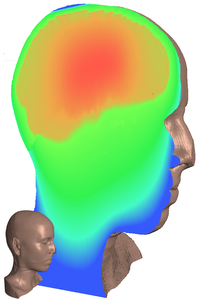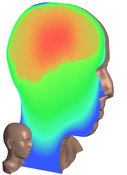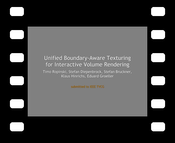Information
- Publication Type: Journal Paper (without talk)
- Workgroup(s)/Project(s):
- Date: November 2012
- Journal: IEEE Transactions on Visualization and Computer Graphics
- Number: 11
- Volume: 18
- Pages: 1942 – 1955
- Keywords: interactive volume rendering, volumetric texturing
Abstract
In this paper, we describe a novel approach for applying texture mapping to volumetric data sets. In contrast to previous approaches, the presented technique enables a unified integration of 2D and 3D textures and thus allows to emphasize material boundaries as well as volumetric regions within a volumetric data set at the same time. One key contribution of this paper is a parametrization technique for volumetric data sets, which takes into account material boundaries and volumetric regions. Using this technique, the resulting parametrizations of volumetric data sets enable texturing effects which create a higher degree of realism in volume rendered images. We evaluate the quality of the parametrization and demonstrate the usefulness of the proposed concepts by combining volumetric texturing with volumetric lighting models to generate photorealistic volume renderings. Furthermore, we show the applicability in the area of illustrative visualization.Additional Files and Images
Additional images and videos
Additional files
Weblinks
BibTeX
@article{Ropinski-2012-UBT,
title = "Unified Boundary-Aware Texturing for Interactive Volume
Rendering",
author = "Timo Ropinski and Stefan Diepenbrock and Stefan Bruckner and
Klaus Hinrichs and Eduard Gr\"{o}ller",
year = "2012",
abstract = "In this paper, we describe a novel approach for applying
texture mapping to volumetric data sets. In contrast to
previous approaches, the presented technique enables a
unified integration of 2D and 3D textures and thus allows to
emphasize material boundaries as well as volumetric regions
within a volumetric data set at the same time. One key
contribution of this paper is a parametrization technique
for volumetric data sets, which takes into account material
boundaries and volumetric regions. Using this technique, the
resulting parametrizations of volumetric data sets enable
texturing effects which create a higher degree of realism in
volume rendered images. We evaluate the quality of the
parametrization and demonstrate the usefulness of the
proposed concepts by combining volumetric texturing with
volumetric lighting models to generate photorealistic volume
renderings. Furthermore, we show the applicability in the
area of illustrative visualization.",
month = nov,
journal = "IEEE Transactions on Visualization and Computer Graphics",
number = "11",
volume = "18",
pages = "1942--1955",
keywords = "interactive volume rendering, volumetric texturing",
URL = "https://www.cg.tuwien.ac.at/research/publications/2012/Ropinski-2012-UBT/",
}



